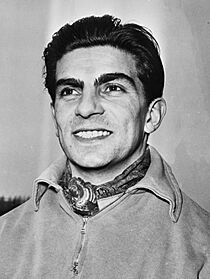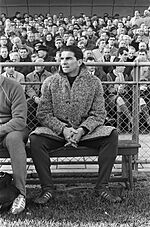Frans de Munck facts for kids

Frans de Munck in 1957
|
|||
| Personal information | |||
|---|---|---|---|
| Date of birth | 20 August 1922 | ||
| Place of birth | Goes, Netherlands | ||
| Date of death | 24 December 2010 (aged 88) | ||
| Place of death | Arnhem, Netherlands | ||
| Position(s) | Goalkeeper | ||
| Youth career | |||
| 1930–1937 | VV Goes | ||
| Senior career* | |||
| Years | Team | Apps | (Gls) |
| 1937–1944 | VV Goes | ||
| 1944–1950 | Sittardse Boys | ||
| 1950–1954 | 1. FC Köln | 100 | (2) |
| 1954–1957 | Fortuna '54 | 34 | (0) |
| 1957–1961 | DOS | 82 | (0) |
| 1961–1964 | Veendam | 102 | (0) |
| 1964–1965 | Cambuur | 31 | (0) |
| 1965–1966 | Vitesse | 30 | (0) |
| International career | |||
| 1949–1960 | Netherlands | 31 | (0) |
| Managerial career | |||
| 1966–1969 | Vitesse | ||
| 1969–1971 | Club Brugge | ||
| 1971 | Lierse | ||
| 1972–1974 | Vitesse | ||
| *Club domestic league appearances and goals | |||
Frans de Munck was a famous Dutch football player and coach. He was born on August 20, 1922, and passed away on December 24, 2010.
People called him The Black Panther. This was because of his dark hair, black jersey, and amazing, quick moves like a cat. He helped his teams win big titles. He won the Eredivisie (Dutch top league) with VV DOS in 1958. He also won the KNVB Cup (Dutch national cup) with Fortuna '54 in 1957.
For four years, he played for a top German team, 1. FC Köln. From 1949 to 1960, he played 31 games for the Dutch national team.
Contents
Frans de Munck's Early Life
Frans de Munck grew up in Goes, a town in the Zeeland region of the Netherlands. His father worked at a gas company.
As a young boy, Frans loved sports. He didn't just play football. He also enjoyed cycling, athletics, korfball, and handball. He was especially good at athletics. He even won the Zeeland championship for javelin throw. He was also a talented handball player.
Frans de Munck's Playing Career
Playing for VV Goes
Frans de Munck started playing football very young. At age eight, he often watched practices for the local club, VV Goes. The older players would ask him to be a goalkeeper so they could practice shooting.
Frans wanted to be a forward (a player who scores goals). But a knee injury changed his path. He realized he was very good at being a goalkeeper. He became a talented goalie. At just 15 years old, in 1937, he played his first game for the senior team of VV Goes.
Playing for Sittardse Boys
During World War II, Frans de Munck was offered a chance to play for a German club. He refused this offer. Instead, he was told he had to work in a German arms factory.
To avoid this, a club called Sittardse Boys offered him a way out. They gave him a paid contract in 1944. This deal saved him from forced labor in Germany. In Sittard, he also got a special document. After the war, he worked as a police officer there. He even played for the Dutch police football team.
At Sittardse Boys, Frans played in the Eredivisie, which is the top football league in the Netherlands. In 1947, FC Barcelona wanted him to play for them as a professional. But he said no. At that time, only amateur players could play for the Dutch national team. He didn't want to lose his chance to play for his country. He made his debut for the Netherlands in 1949.
In 1950, Ajax also tried to sign him. But the move didn't happen. The Royal Dutch Football Association (KNVB) found out that Frans had been paid while playing for Sittardse Boys. The KNVB was very strict about players being amateurs. Because of this, Frans was banned from playing for the KNVB for one year. Like many top Dutch players then, he moved to play abroad.
Playing for 1. FC Köln
Frans de Munck became the first professional football player for 1. FC Köln in Germany. He quickly showed how good he was. He was strong at stopping shots and controlling the penalty area. His skills helped the Cologne team finish the season with very few goals scored against them. They ended up in fourth place.
In his second year, he competed with another goalkeeper, Fritz Herkenrath. Frans won the spot as the main goalie. 1. FC Köln finished fifth and then second in the next seasons. In 1954, they reached the final of the DFB-Pokal (German Cup). They lost the final 1–0 to VfB Stuttgart.
Frans played over 100 league games for 1. FC Köln. He even scored two goals! He also played in important play-off games for the German championship and cup competitions.
Playing for Fortuna '54, DOS, and Retirement

In 1954, Frans de Munck joined Fortuna '54. This was one of the first professional football clubs in the Netherlands. With Fortuna, Frans won the KNVB Cup in 1957. They beat Feijenoord 4–2 in the final.
After that, he moved to VV DOS. In his first season with DOS, he helped them win the championship. This was the club's first and only championship! They then played in the European Cup. DOS, with Frans as goalie, lost to Sporting CP from Portugal and were knocked out.
He stayed with DOS until 1961. Then, at 39 years old, he played for second-tier clubs like Veendam, Cambuur, and Vitesse. Frans de Munck retired from playing at age 44. His last game was a friendly match between Vitesse and 1. FC Köln on May 28, 1967.
Frans de Munck's International Career
In 1949, Frans de Munck played his first two games for the Dutch national team, known as Oranje. In his first game against France, he came on as a substitute. The Netherlands won 4–1. He also played in a 2–1 win against Denmark.
Later, he was banned from the national team because he was a professional player. But after the big North Sea flood of 1953, he played in a special charity game. This game, called the Watersnoodwedstrijd, helped bring professional football to the Netherlands.
A year later, Frans returned to the national team. He was the main goalkeeper until 1960. He only managed to keep a clean sheet (no goals conceded) in six of his international matches. His biggest defeat was a 1–5 loss to Spain in 1957. In that game, Alfredo Di Stéfano scored three goals against him. His last game for the Netherlands was on April 24, 1960, against Belgium.
Frans de Munck's Managerial Career
Frans de Munck's coaching career had a tricky start. The KNVB initially said he couldn't coach because he didn't have the right qualifications. So, he went to a sports school in Cologne, Germany, to get his coaching diploma.
The KNVB still didn't want to accept his diploma at first. But Prince Bernhard, who was a friend of Frans, helped out. After the Prince's help, the KNVB finally allowed him to be a manager.
Frans started coaching in 1966 at Vitesse, while he was still playing. He took over as head coach after the previous coach was let go.
After coaching Vitesse, Frans moved to Belgium. He coached Club Brugge and won the Belgian Cup with them in 1970. Then he coached Lierse. In 1972, he returned to Vitesse as head coach and stayed until 1974. After that, he coached amateur clubs and ended his career as a youth coach at FC Dordrecht.
Frans de Munck's Death
Frans de Munck passed away on December 24, 2010. He was 88 years old. He died in his hometown of Arnhem, where he was also cremated.
Frans de Munck's Honours
As a Player
1. FC Köln
- DFB-Pokal runner-up: 1953–54
Fortuna '54
- KNVB Cup: 1956–57
DOS
Cambuur
- Tweede Divisie: 1964–65
As a Manager
Club Brugge
- Belgian Cup: 1969–70
 | John T. Biggers |
 | Thomas Blackshear |
 | Mark Bradford |
 | Beverly Buchanan |


